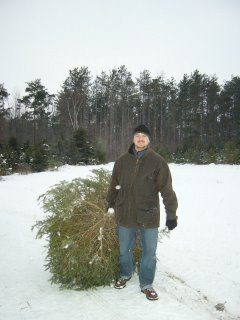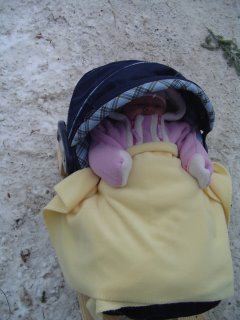
The blitz of holiday cheer my parents are capable of delivering can be measured in megatons. Best left to the seasoned pros ...
Merry Christmas, everyone.
I want to live my life taking the risk all the time that I don't know anything like enough yet.

The blitz of holiday cheer my parents are capable of delivering can be measured in megatons. Best left to the seasoned pros ...
Merry Christmas, everyone.
 Happy Christmas Eve, everyone ... I just finished helping lug up all the gifts from the basement to put under the tree, and think I may have herniated a disc. I tried to beg off, claiming that my fragile belief in Santa would be in jeopardy, but no dice.
Happy Christmas Eve, everyone ... I just finished helping lug up all the gifts from the basement to put under the tree, and think I may have herniated a disc. I tried to beg off, claiming that my fragile belief in Santa would be in jeopardy, but no dice.




We are arriving at a point in this city's development that we might soon expect to see some urban decay. To that end, I am on the lookout for the Dickens Whitechapel and Dickens Red Light District; perhaps some Dickens Tenement Housing, and some little figurines of Fagin and the Artful Dodger, and perhaps Jack the Ripper just for good measure.
But then, my parents don't seem to amenable to my suggestions for such social realism ...
 I was very saddened the other day to learn that John Spencer, the actor who played White House chief of staff Leo McGarry on The West Wing died of a heart attack. It's a testament to his talents as an actor that I would feel the loss so keenly -- he was a perfect fit as the exacting, rough-edged but compassionate McGarry, and brought a great depth to the character.
I was very saddened the other day to learn that John Spencer, the actor who played White House chief of staff Leo McGarry on The West Wing died of a heart attack. It's a testament to his talents as an actor that I would feel the loss so keenly -- he was a perfect fit as the exacting, rough-edged but compassionate McGarry, and brought a great depth to the character. Mere hours after being home I was sitting by a fire with a single malt scotch and catching up with my parents. And then after dinner I wandered over to see my brother and sister-in-law, and, more importantly, my niece -- now almost five months old but grown well past that. A solid, and disturbingly strong (my finger, ouch) baby.
Mere hours after being home I was sitting by a fire with a single malt scotch and catching up with my parents. And then after dinner I wandered over to see my brother and sister-in-law, and, more importantly, my niece -- now almost five months old but grown well past that. A solid, and disturbingly strong (my finger, ouch) baby.

 No, not Bob Dylan, but the guy from whom Bob stole his last name: poet Dylan Thomas, whose "A Child's Christmas in Wales" is currently playing on my iPod.
No, not Bob Dylan, but the guy from whom Bob stole his last name: poet Dylan Thomas, whose "A Child's Christmas in Wales" is currently playing on my iPod.
My poor car ...
Several things were clarified for me, or at least certain purchases were. I now know I should probably buy:
- Snow tires, or possibly an M1A1 Abrams, for traversing this city's hills.
- Cross-country skis, or possibly a sled with a dozen huskies.
- A garage.
- A massive gravitational manipulator that will shift the earth's orbit enough to make Newfoundland's climate more like Barbados (what do you think -- Sharper Image? LL Bean? EBay? There's got to be one available somewhere ...)

